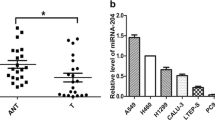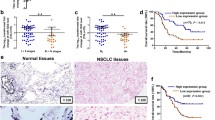Abstract
MicroRNAs (miRNAs) are a class of small non-coding RNAs that, when dysregulated, are involved in the initiation and progression of various cancers, including lung cancer, in humans. In the current study, qRT-PCR was performed to measure miR-211 expression in human non-small cell lung cancer (NSCLC) cell lines and tissues. Cell proliferation, cell cycle, colony formation, and invasion were performed to detect the functional role of miR-211 in human NSCLC cell line. We used luciferase reporter assay to find the potential target of miR-211. We found that miR-211 expression was upregulated in human non-small cell lung cancer (NSCLC) cell lines and tissues. The overexpression of miR-211 enhanced NSCLC cell proliferation, colony formation, and invasion. SRC kinase signaling inhibitor 1 (SRCIN1) was identified as a direct target of miR-211. SRCIN1 silencing promoted cell proliferation, and SRCIN1 expression was downregulated in human NSCLC cell lines. Thus, miR-211 may function as an oncogenic miRNA in NSCLC, partly by regulating SRCIN1, and the modulation of miR-211 expression represents a potential strategy for the treatment of NSCLC patients.





Similar content being viewed by others
References
Sun Y, Ai X, Shen S, Lu S. NF-kappaB-mediated miR-124 suppresses metastasis of non-small-cell lung cancer by targeting MYO10. Oncotarget. 2015.
Zhang ZY, Fu SL, Xu SQ, Zhou X, Liu XS, Xu YJ, et al. By downregulating Ku80, hsa-miR-526b suppresses non-small cell lung cancer. Oncotarget. 2015;6:1462–77.
Ai C, Jiang R, Fu L, Chen Y. MicroRNA-495 mimics delivery inhibits lung tumor progression. Tumour Biol J Int Soc Oncodev Biol Med. 2015;36:729–35.
Du B, Wang Z, Zhang X, Feng S, Wang G, He J, et al. MicroRNA-545 suppresses cell proliferation by targeting cyclin D1 and CDK4 in lung cancer cells. PLoS One. 2014;9:e88022.
Sabarinathan R, Wenzel A, Novotny P, Tang X, Kalari KR, Gorodkin J. Transcriptome-wide analysis of UTRs in non-small cell lung cancer reveals cancer-related genes with SNV-induced changes on RNA secondary structure and miRNA target sites. PLoS One. 2014;9:e82699.
Chen C, Zhao Z, Liu Y, Mu D. MicroRNA-99a is downregulated and promotes proliferation, migration and invasion in non-small cell lung cancer a549 and h1299 cells. Oncol Lett. 2015;9:1128–34.
Yu T, Li J, Yan M, Liu L, Lin H, Zhao F, Sun L, Zhang Y, Cui Y, Zhang F, He X, Yao M. MicroRNA-193a-3p and -5p suppress the metastasis of human non-small-cell lung cancer by downregulating the ERBB4/PIK3R3/MTOR/S6K2 signaling pathway. Oncogene. 2014.
Yin M, Ren X, Zhang X, Luo Y, Wang G, Huang K, Feng S, Bao X, He X, Liang P, Wang Z, Tang H, He J, Zhang B. Selective killing of lung cancer cells by miRNA-506 molecule through inhibiting NF-kappaB p65 to evoke reactive oxygen species generation and p53 activation. Oncogene. 2014.
Zhang B, Liu T, Wu T, Wang Z, Rao Z, Gao J. MicroRNA-137 functions as a tumor suppressor in human non-small cell lung cancer by targeting SLC22A18. Int J Biol Macromol. 2015;74:111–8.
Jiang C, Hu X, Alattar M, Zhao H. Mirna expression profiles associated with diagnosis and prognosis in lung cancer. Exp Rev Anticancer Ther. 2014.
Shi WY, Liu KD, Xu SG, Zhang JT, Yu LL, Xu KQ, et al. Gene expression analysis of lung cancer. Eur Rev Med Pharmacol Sci. 2014;18:217–28.
Ohdaira H, Sekiguchi M, Miyata K, Yoshida K. MicroRNA-494 suppresses cell proliferation and induces senescence in A549 lung cancer cells. Cell Prolif. 2012;45:32–8.
Wang K, Jia Z, Zou J, Zhang A, Wang G, Hao J, et al. Analysis of hsa-miR-30a-5p expression in human gliomas. Pathol Oncol Res POR. 2013;19:405–11.
Chiang Y, Zhou X, Wang Z, Song Y, Liu Z, Zhao F, et al. Expression levels of microRNA-192 and −215 in gastric carcinoma. Pathol Oncol Res POR. 2012;18:585–91.
Li Z, Yu X, Shen J, Jiang Y. MicroRNA dysregulation in uveal melanoma: a new player enters the game. Oncotarget. 2015.
Li Z, Yu X, Shen J, Wu WK, Chan MT. MicroRNA expression and its clinical implications in Ewing’s sarcoma. Cell Prolif. 2015;48:1–6.
Luo X, Dong Z, Chen Y, Yang L, Lai D. Enrichment of ovarian cancer stem-like cells is associated with epithelial to mesenchymal transition through an miRNA-activated Akt pathway. Cell Prolif. 2013;46:436–46.
Zhou J, Song S, Cen J, Zhu D, Li D, Zhang Z. MicroRNA-375 is downregulated in pancreatic cancer and inhibits cell proliferation in vitro. Oncol Res. 2012;20:197–203.
Yu X, Li Z, Shen J, Wu WK, Liang J, Weng X, et al. MicroRNA-10b promotes nucleus pulposus cell proliferation through RhoC-Akt pathway by targeting HOXD10 in intervertebral disc degeneration. PLoS One. 2013;8:e83080.
Li Z, Yu X, Shen J, Chan MT, Wu WK. MicroRNA in intervertebral disc degeneration. Cell Prolif. 2015.
Liang J, Zhang Y, Jiang G, Liu Z, **ang W, Chen X, et al. miR-138 induces renal carcinoma cell senescence by targeting EZH2 and is downregulated in human clear cell renal cell carcinoma. Oncol Res. 2013;21:83–91.
Li Z, Lei H, Luo M, Wang Y, Dong L, Ma Y, et al. DNA methylation downregulated miR-10b acts as a tumor suppressor in gastric cancer. Gastr Cancer Off J Int Gastr Cancer Assocthe Japan Gastr Cancer Assoc. 2015;18:43–54.
Ouchida M, Kanzaki H, Ito S, Hanafusa H, Jitsumori Y, Tamaru S, et al. Novel direct targets of miR-19a identified in breast cancer cells by a quantitative proteomic approach. PLoS One. 2012;7:e44095.
Ma R, Yan W, Zhang G, Lv H, Liu Z, Fang F, et al. Upregulation of miR-196b confers a poor prognosis in glioblastoma patients via inducing a proliferative phenotype. PLoS One. 2012;7:e38096.
Ye M, Zhang J, Miao Q, Yao L. Curcumin promotes apoptosis by activating the p53-miR-192-5p/215-XIAP pathway in non-small cell lung cancer. Cancer Lett. 2015;357:196–205.
Huang WC, Chan SH, Jang TH, Chang JW, Ko YC, Yen TC, et al. Mirna-491-5p and GIT1 serve as modulators and biomarkers for oral squamous cell carcinoma invasion and metastasis. Cancer Res. 2014;74:751–64.
Zhang J, Xu L, Yang Z, Lu H, Hu D, Li W, et al. MicroRNA-10b indicates a poor prognosis of non-small cell lung cancer and targets e-cadherin. Clin Transl Oncol Off Publ Fed Spanish Oncol Soc Nat Cancer Inst Mexico. 2015;17:209–14.
Chu TH, Yang CC, Liu CJ, Lui MT, Lin SC, Chang KW. miR-211 promotes the progression of head and neck carcinomas by targeting TGFbetaRII. Cancer Lett. 2013;337:115–24.
**a B, Yang S, Liu T, Lou G. miR-211 suppresses epithelial ovarian cancer proliferation and cell-cycle progression by targeting cyclin D1 and CDK6. Mol Cancer. 2015;14:322.
Song GQ, Zhao Y. MicroRNA-211, a direct negative regulator of CDC25B expression, inhibits triple-negative breast cancer cells’ growth and migration. Tumour Biol J Int Soc Oncodev Biol Med. 2015.
Cai C, Ashktorab H, Pang X, Zhao Y, Sha W, Liu Y, et al. MicroRNA-211 expression promotes colorectal cancer cell growth in vitro and in vivo by targeting tumor suppressor CHD5. PLoS One. 2012;7:e29750.
Qu S, Yao Y, Shang C, Xue Y, Ma J, Li Z, et al. MicroRNA-330 is an oncogenic factor in glioblastoma cells by regulating SH3GL2 gene. PLoS One. 2012;7:e46010.
Rao SA, Arimappamagan A, Pandey P, Santosh V, Hegde AS, Chandramouli BA, et al. miR-219-5p inhibits receptor tyrosine kinase pathway by targeting EGFR in glioblastoma. PLoS One. 2013;8:e63164.
Gao B, Gao K, Li L, Huang Z, Lin L. miR-184 functions as an oncogenic regulator in hepatocellular carcinoma (HCC). Biomed Pharm Biomed Pharmacother. 2014;68:143–8.
Shen Q, Bae HJ, Eun JW, Kim HS, Park SJ, Shin WC, et al. miR-101 functions as a tumor suppressor by directly targeting nemo-like kinase in liver cancer. Cancer Lett. 2014;344:204–11.
Maftouh M, Avan A, Funel N, Frampton AE, Fiuji H, Pelliccioni S, et al. miR-211 modulates gemcitabine activity through downregulation of ribonucleotide reductase and inhibits the invasive behavior of pancreatic cancer cells. Nucleosides, Nucleotides Nucleic Acids. 2014;33:384–93.
Chitnis NS, Pytel D, Bobrovnikova-Marjon E, Pant D, Zheng H, Maas NL, et al. miR-211 is a prosurvival microRNA that regulates chop expression in a PERK-dependent manner. Mol Cell. 2012;48:353–64.
Boyle GM, Woods SL, Bonazzi VF, Stark MS, Hacker E, Aoude LG, et al. Melanoma cell invasiveness is regulated by miR-211 suppression of the BRN2 transcription factor. Pigment Cell Melanoma Res. 2011;24:525–37.
Xu X, Wang W, Su N, Zhu X, Yao J, Gao W, et al. miR-374a promotes cell proliferation, migration and invasion by targeting SRCIN1 in gastric cancer. FEBS Lett. 2015;589:407–13.
Damiano L, Di Stefano P, Camacho Leal MP, Barba M, Mainiero F, Cabodi S, et al. p140Cap dual regulation of E-cadherin/EGFR cross-talk and Ras signalling in tumour cell scatter and proliferation. Oncogene. 2010;29:3677–90.
Kennedy S, Clynes M, Doolan P, Mehta JP, Rani S, Crown J, et al. SNIP/p140Cap mRNA expression is an unfavourable prognostic factor in breast cancer and is not expressed in normal breast tissue. Br J Cancer. 2008;98:1641–5.
Cao M, Hou D, Liang H, Gong F, Wang Y, Yan X, et al. miR-150 promotes the proliferation and migration of lung cancer cells by targeting SRC kinase signalling inhibitor 1. Eur J Cancer. 2014;50:1013–24.
Author information
Authors and Affiliations
Corresponding author
Additional information
Leiguang Ye and Hui Wang are co-first authors
Rights and permissions
About this article
Cite this article
Ye, L., Wang, H. & Liu, B. miR-211 promotes non-small cell lung cancer proliferation by targeting SRCIN1. Tumor Biol. 37, 1151–1157 (2016). https://doi.org/10.1007/s13277-015-3835-y
Received:
Accepted:
Published:
Issue Date:
DOI: https://doi.org/10.1007/s13277-015-3835-y




